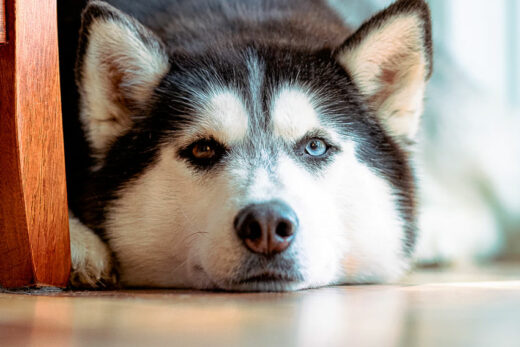
Dog diarrhea is most commonly associated with colitis in dogs, which is essentially caused by an inflammation of the colon which results in soft stools. Dog diarrhea can be a distressing for both dog and owner and can mean frequent trips to the vet.
Diarrhea in dogs on the whole is not a life-threatening condition. However older dogs, puppies and smaller dogs can often find it tough when dealing with dog diarrhea so it’s worth keeping an eye on dog colitis too.
What causes diarrhoea in dogs?
Diarrhoea occurs when the food passes through the gut too quickly and not enough of the nutrients and water are absorbed and it can be caused by a number of factors. Issues like buying poor-quality and cheap pet food can have an adverse effect on a dog’s digestion system which in turn leads to dog colitis. Overeating can also leave you with a dog colitis problem. This can occur when dogs are fed just once a day and certain foods sometimes don’t agree with a dog and lead to dog diarrhoea. Dogs, like humans, can suffer from stress and this can also present a dog diarrhea problem.
There are however a wider range of possible causes including:
- A bacterial, viral or parasitic infection
- Stress (such as a long car ride)
- Dietary indiscretion (when your cheeky pooch eats something they shouldn’t have)
- Toxin ingestion
- An abrupt diet change
- A food allergy or sensitivity
- Inflammatory Bowel Disease
- Colitis
- Intestinal cancer
- Hormonal disorders such as Addison’s disease. Etc.
When a vet is presented with a dog with diarrhoea, they will look at their age, breed and medical history when assessing the possible causes. Younger dogs are more prone to parasites while cancer tends to affect the older population.
Diarrhea in puppies
As diarrhoea in puppies is so very common, it really deserves a whole section to itself. For many puppy owners, the first health issue they will encounter is loose stool. The combination of leaving mum for the first time, a long car ride, a diet change and a trip to the vets is the ‘perfect storm’ for some individuals when it comes to developing runny stool. It is also true that many puppies are born with a worm burden and this is not always successfully eradicated by the breeder.
Signs and symptoms
For most owners, diarrhoea in their dog will be something they are familiar with. At one time or another, the vast majority of dogs will develop loose stools. This may only last a short while or may continue for several weeks in some individuals.
Loose stool can be accompanied by other signs such as





